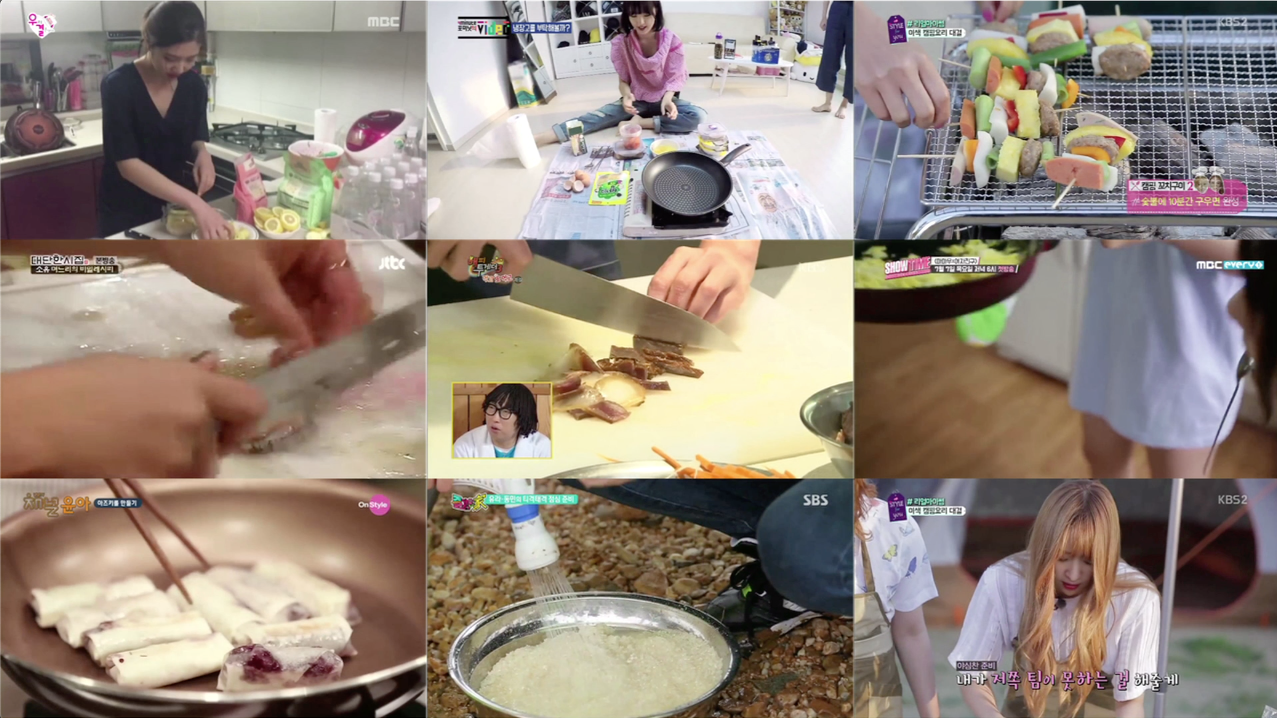
The Korean word “Agassi” refers to a young woman of childbearing age.1 The video Agassi (2017) deals with Korean misogyny, especially in regards to how the K-Pop music market, known as an abbreviation for Korean pop music, has used images of young women. K-Pop entertainment is a huge business in Asia. The biggest entertainment companies are all run by men. Furthermore in most shows produced, men seize the spotlight, and women are left secondary roles which only support the male lead. Not only in TV shows but also in film, it is difficult to find a woman as the main character. The fact that people in Korea do not question K-Pop illustrates the patriarchy and male chauvinism within the country.
The K-Pop business demands that teenage girls dress scantily and dance provocatively. Young girls are consumed as sexual objects, but people do not consider this within the Child, Young Boys and Girls’ Sex Protection Law. Their bodies are rated like meat, ranging between good and unacceptable. Most of male culture likens sex (and thus sexual assault) to eating a woman or scoring her deliciousness. These kinds of ideas expose a patriarchal system in which assault on women is viewed as a consumption of sexual objects.2
The girls in K-Pop are required to be ambivalent, being sexy and at the same time, being innocent and pure. If they cannot keep a balance between those demands, they cannot work in this business anymore. They are fired even if they want to keep the job.

They are nicknamed by men. Actually, such voyeurism includes jealousy of objects and anxiety about pleasure of enjoyment. Jealousy changes often to aggression, and anxiety is accompanied by oppression. Men who enjoy following idol girls can become aggressive when they feel their sexual fantasy has been broken. This is immature action. Like a sort of separation and abuse, a man wants to abuse a woman, if he cannot have her.3
In Korean SNS (Social Network System) and the Internet, there are many demeaning words to refer to women while less similar versions exist for men. Some of these words for example are ‘Kimchi Girl’ (a belittling nickname for a Korean woman), ‘Soy Bean Girl’ (a high maintenance woman), ‘Plastic Surgery Girl’, and ‘Mrs. Kim’ (a middle-aged women, especially one who cannot drive a car well). The object being (nick)named is always part of a disadvantaged group. The categorization of people comes from the ruling, hegemonic view. This is called a classification system. If the established group has many classifications, the group has been formed by the so called second-class citizens.4
In 2015 there was research into Korean men’s life by the Korean Women’s Development Institute which included interviews from Korean women. Since ‘Kimchi Girl’ and ‘Soy Bean Girl’ began to emerge in Korean society, women have tried to prove that they do not belong to these categorizations.5 This categorizing restricts women’s behavior and activities. Women are forced to constantly control themselves to avoid being nicknamed by men. This is called stereotype threat effect: “If negative stereotypes are present regarding a specific group, group members are likely to become anxious about their performance, which may hinder their ability to perform at their maximum level.”6 Stereotype threat effect is a part of rape culture.
‘A Toronto policeman giving a safety talk at a university told female students no to dress like sluts. Soon after, Slutwalks became an international phenomenon, of mostly young, often sexily dressed women taking back public space (rather like the Take Back the Night walks of the 1980s, but with more lipstick and less clothing). Young feminists are thrilling phenomenon: smart, bold, funny defenders of rights and claimers of space - and changers of the conversation. That Policeman’s “slut” comment was part of the emphasis colleges have put on telling female students how to box themselves in safely - don’t go here, don’t do that - rather than telling male students not to rape: this is part of rape culture.’7
Limiting women to inferior roles in TV shows becomes an extension of the overall societal restrictions put on women. Young girls are invited to TV shows as guests where they have no authority and are demanded to satisfy men’s needs. At these shows, most of the men are not the same age as the girls. They are older and have more broadcasting experience. Moreover, the host which leads the show is always a man.

1. Cf.: The National Institute of the Korean Language, http://stdweb2.korean.go.kr,
Opened on 17.10.2016
2. Cf.: Jung Hee-Jin, The Challenge of Feminism, p.99-100
3. Cf.: Kim Heung-Kyung, Jungang Newspaper,http://mnews.joins.com/article/20024280#home,
Opened on 14.05.2016
4. Prof. Na-Young Lee (Jungang University), EBS Focus ‘Loathing’, https://www.youtube.com/watch? v=fdZZKLaBX9M, Broadcated by EBS on 03.10.2014
5. Cf.: A Basic Study on the Men Lives(II), Sang-Su Ahn, In-Sun Kim,
Jeong-Hyun Lee and Bo-La Yun, Published by Korean Women’s Development Institute, 2015
6. Wikipedia, https://en.wikipedia.org/wiki/Stereotype_threat, Opened on 30.11.2016
7. Cf.: Rebecca Solnit, Men Explain Things to Me: And Other Essays, p.224
This project was supported by Academy of Fine Arts Vienna.